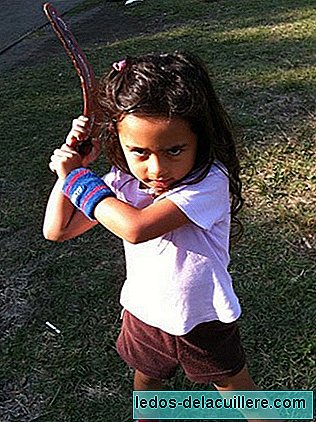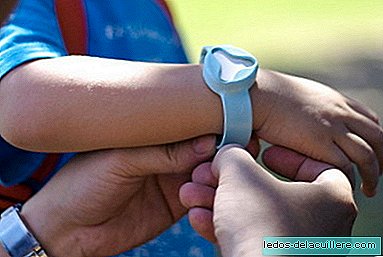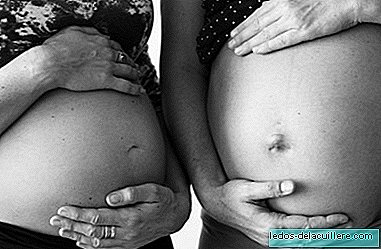
Many people wonder what is it that causes many children today to have reprehensible behavior in adolescence. Faced with this question, some say that it is the lack of authoritarianism, others that it is the excess of permissiveness and others (among which I am), that what is missing are parents who spend time with their children. It's not that others don't have a certain degree of reason, it's that they stay on the surface.
Authoritarianism as an educational method
Return to the authoritarian education model, typical of earlier times, where parents exercise their authority because, using physical and psychological violence, shouting, threats and punishment It is not the solution, because although it is possible to control the acts of children, getting them to be teenagers and adults in the future with a sense of responsibility such that such education is considered a relative success, many children rebel against what they consider unfair (“because I say it and period ”,“ it is for your own good ”,“ do not answer me ”,“ while you live under my roof ”), precisely what happened was to avoid happening, so that the child ends up facing his parents. In addition, many (most) adults who consider themselves responsible people (examples of the "success" of authoritarianism), drag (drag) serious problems of self-esteem and decision-making capacity.
When you have grown up in an environment in which your opinion does not matter too much, your actions should fall within a narrow margin created by your parents and you end up doing only what they think is right and discarding what seems wrong to you, when you think that you are doing something right and the result is such a anger that you end up scared, cornered in your room managing only those negative emotions, which you do not know how to overcome, you end up giving yourself completely to the power of your parents telling them: “Ok dad, mom, like I don't know, tell me how to do it. I do not want to be wrong. I do not want to suffer more".
From that moment on you grow like an automaton, doing only what others expect of you and correcting in the act what you see that will not be well received. Thus the child becomes a teenager and finally an adult, always focused on the constant search for a reference that keeps telling him what is right and what is not. Parents are still that reference (sometimes even when their children no longer live with them), they are the teachers, the bosses are, the classmates who act as group leaders (for better or worse) and they are the couples they are going through, until they find one capable of making the decisions that these children (already adults) do not know how to make for themselves.
Permissiveness as an educational method
Many adults today, children of authoritarian parents, decided at some point in their lives not repeat the educational model of their parents and let the children do everything they could not do. Let's say it could be something like reliving the life of a child, through the children, taking care of everything they could not live, enjoying life to the fullest, without rules, without limits, covering everything and everyone, ...
The problem is that permissiveness is not an educational method. Absolute permissiveness is to leave children to their free will, in a world without norms or values. That is not to educate, that is to be an irresponsible father and that is to play with fire, because perhaps a child is able to learn to behave according to some external model (other than his parents), but many will learn to do it in the same way as their parents: happening everything.

So parents get children to put their desires and their needs always, even when they are no longer babies, to those of others. This doesn't have to be a problem. per seWell, perhaps the maximum aspiration of a child is to have food on the table when he is hungry, a place to go to learn and where to make friends, a home in which to sleep sheltered from the cold and some toys to learn and develop. However, this is not usually the case, and in a climate where parents do not respect their children, because they do not instill values (if they respect them they will educate them) Children can learn not to respect others and to use their own and other people's freedoms, for their sole benefit.
As you can see, this educational model is not suitable either.
The problem is that children grow up "without parents"
I said that what happens is that What is missing are parents who spend time with their children. This statement is reductionist and neglects a problem that is much broader and that we should consider multifactorial, since a child is educated by his parents, his immediate family, television, friends, the teacher, the supermarket cashier, the who throws a paper on the floor in the middle of the street, the friend of dad who says that the Moors should stay in their country, the neighbor who slams left and right screaming like a possessed, the mother of the child of the park that allows him hit your son "because they are children's things" and the lady who comes to tell him that he is going to steal his brother or that he will take him kidnapped (and stop, that would never end).
As you can see, there are many factors, but there is one that stands out among all, which is the lack of parents: Today's children grow up without parents, because their parents hardly spend time with their children.

That is why I say that those who advocate authoritarianism or who simply criticize the permissive model remain on the surface. It's not that parents do A, B or C, it's that parents aren't there to educate their children.
Authoritarian parents are, in a way, (at least they educate them, in their own way, but they educate them), however children, as I said before, they end up creating distance themselves, for their own emotional security, as they grow. As a child they forgive everything, but when they start to be more aware they try to run away in a way to avoid doing something that bothers me (“if Dad doesn't see me, he will hardly censor what I am doing”). If you are parents who work hard, like most, and see little of their children, imagine the (little) relationship. I, son of an authoritarian father, remember running up the stairs when I heard that my father was coming at six in the afternoon, and that I had not seen him all day. Not out of fear, but out of habit.
Permissive parents are not. These do not matter whether they work or do not work, because wherever they are, they do not educate their children. Children, who deserve love, respect and someone who gives them security and example, end up making themselves from lack, from lack and the result is hardly good.
Finally there are the parents who do try to educate their children, but for whatever reason they are not long enough with them. Yesterday a news article was published in the media that said parents do not play with their children because they do not have time and on several occasions we have commented on Babies and more that parents spend less time with their children than they should, or in other words, children spend less time with their parents than they need.
This causes them to grow up with a strange sense of lack (they don't know anything else, so they can't compare) and lack of reference, which can affect their emotional development in the form of lack of self-esteem.

When interviewing problematic teenage children, sooner or later there is a problem in the relationship between parents and children. The lack of communication and lack of trust (inheritance of the lack of timeshare in childhood) are probably the biggest problem. The boys and girls, after eliminating the first layers of rebellion (“I am like that and I will continue like this, I will never change”) and once they get to explain what they really feel, they usually say that “my parents don't care what I do, as always ”, that“ my parents are never at home when I need them, so now it will not be different ”or that“ my parents do not care, in fact I have never cared, they have always complained about everything I have done, everything seems wrong ”, to give some examples.
This is not mathematical, of course. There are parents who do wonders in a short time, simply respecting their children and taking advantage of daily weekends and weekends to show their children that they are an active part of their world (that of parents), that they are important to them and that they give thanks (to God, to heaven or to life) for having them.
The problem is when parents are not when they work and are not when they do not work. Because of this, many teenagers today are lost and that is why some of them end up being called “ninis” (neither study nor work), because they reject everything that their parents seem to value more than their children (“my parents studied hard to to work hard and they don't pay attention to me… I don't want this life ”) and that's why they lose the respect of adults, who think they know everything and think they are“ better than us, young people ”, without really being.
Not everything is lost
Not everything is lost, because not all teenagers get drunk, get high, commit suicide or are potential criminals and, in any case, many of the responsible adults who fulfill their obligations every day were problematic teenagers.
However, there are many children who today are more alone than they should and yes there are many parents who barely share time and dialogue with their children.
Known the problem, the solution is known: more time with the children. Not everything is lost because adults have in our hands the future of our children and, as responsible and experienced people, we are able to find solutions that benefit our children.
Personally, I am already educating my son in a climate of respect and trust, not to be so or handle, but because I think that, as a person, I should treat him like this. Respect is not permissiveness, but let you do what you want to do when you can do it and instill rules and values when you can't do it and, above all, teach him to love his freedom and to respect the freedom of others.












